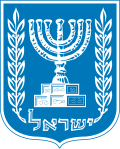| Part of a series on |
| Liberalism in Israel |
|---|
 |
Liberalism has played a role in Israel since the country's founding. [1] Several liberal political parties have claimed substantial popular support, mainly proved by having representation in the Knesset. While liberalism is usually suspicious of nationalism, Jewish liberals in Israel generally support some form of Zionism. They tend to be more receptive towards a Two-state solution.
Contents
- Overview
- Timeline
- From General Zionists to Liberal Party
- From Progressive Party to Independent Liberals
- Shinui, Democratic Movement, Shinui, Hetz, Yesh Atid, Hosen and minor parties
- Splits from and mergers into Likud
- Zehut
- Liberal party factions
- Media
- See also
- References
Conservative liberals (see General Zionists, Liberal Party) were founding members of the Likud, the country's main conservative party, while social liberals (see Progressive Party, Independent Liberals) were integrated in the social-democratic Labor Party. Later on, a long-time liberal, anti-clerical and pro-free market party was Shinui, a member of the Liberal International (LI). More recently, Kadima was a broad liberal and centrist party, integrating politicians from the left and the right. Current liberal (and liberal Zionist) parties are Yesh Atid (LI member) and Blue and White. New Hope is a national-liberal party. By contrast, Balad draws upon liberal values in its aim to eliminate discrimination against Arab citizens and redefine Israel as a state for all its citizens rather than a "Jewish and democratic state", but it is a secular party rather than a liberal one.